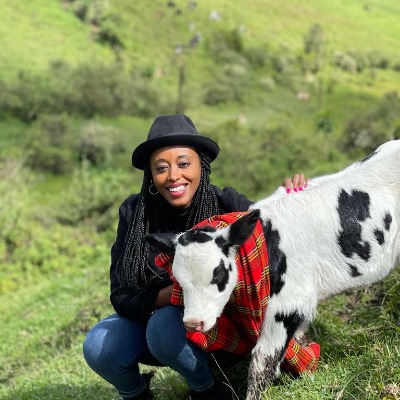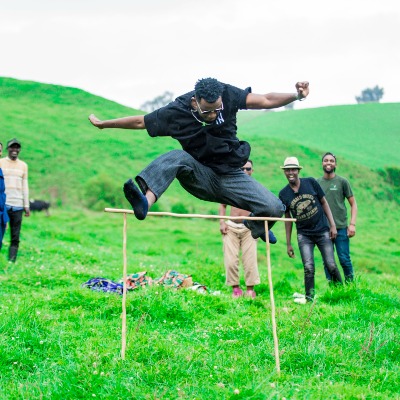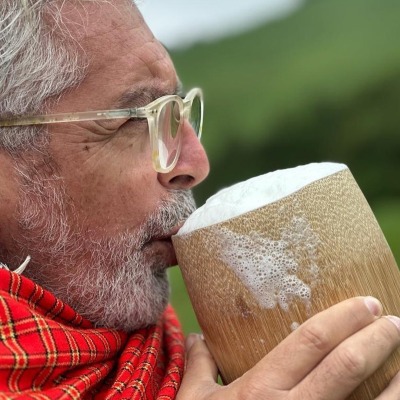Full day cow and hiking experience



Experience a 7-hour adventure, Explore the lush green hills of the farms, milk cows, taste fresh milk, and play cowboy games. Enjoy a traditional lunch and witness the making of traditional ghee. Don't miss the chance to learn about local plants and their traditional uses while enjoying stunning views of the landscape.
Meet at the office on the main road at the Rubavu-Nyabihu Border
Your guide will meet you at the Ibere rya Bigogwe office on the main road. The office is easily located by the arch which marks the border between Rubavu and Nyabihu Districts.
Hiking to Ibere rya Bigogwe
Your guide will start with a briefing about the day ahead. After the briefing you will start your hike towards Ibere rya Bigogwe. Ibere rya Bigogwe is a large rock formation and a famous land mark in the area. The start of the hike takes you through the villages around Bigogwe. After 20 minutes of hiking you will reach the bottom of the rock. The hike continues up the hillsides towards the top of Ibere rya Bigogwe. This part of the hike is a bit steeper and more challenging but passes through a forest. After another 1 hour of hiking you will reach the top of the rock. From here you have a splendid view over the surrounding landscape and you can see Mt. Karisimbi in Volcanoes National Park and Mt. Nyiragongo and Mikeno in DRC. If the weather is clear you will see all the way to Gisenyi town. There is also a meditation point at the top commonly used for praying by locals. Enjoy some cheese and fruit while listening to the story about how this rock got its name. Your guide will also introduce you to some local plants and their traditional uses. Return by hiking to Bigogwe town.
Travel by moto to the farms (by car if you have your own)
After the hiking to Ibere rya Bigogwe it is time to set off for the farms. The same way as locals in the area, you will travel on the back of a motorbike to the farms. The views of the landscape are breathtaking as you leave the main road behind and travel up the hills. A photo stop is usually made at one of the best view points. The trip takes around 30 minutes. Helmet is provided.
Explore the green hills of the farmlands
Once you reach the farms, your guide will introduce you to the cows and cowboys. You will dress in a colorful shuka or rumbiya, the traditional attire of cattle keepers and get a Inkoni, a stick carried by all cattle keepers. Learn about the history of the green hills of Bigogwe, stories about cows and the traditional Rwandan life connected to cows. The hills at the farms are some of most lush and green hills in Africa.
Lunch
A traditional lunch is served outside on the hillside of the farms at Bigogwe.
Milking the cows and tasting of fresh milk
Milking in Bigogwe is done by hands in traditional cans or ibyansi like inkongoro in wood, and Ingare made in bamboo. Get a lesson in milking by hand by the cowboys and try milking on your own. After milking you will taste the special “Bigogwe Cappuccino” as fresh as it gets straight from the cows.
Take the cows to drink water
The cows need lots of water. Twice daily they make their way to the river for a drink. Join the cowboys and use your inkoni (stick) and gentle whistles to move the cows down to the river for a drink. Watch the cowboys as the sing and whistle for the cows as they drink.
Cowboy games
The cowboys spend their life watching the cows. While the cows graze the cowboys have lots of free time. Many games and traditions have been invented by the cowboys. The most common games are URUKIRAMENDE or high jump, Kunyobanwa or stick fighting and Igisoro, a traditional game played with dried seeds on a wooden board. Watch the cowboys master these games and try on your own.
Traditional songs for the cows
When the cows rest after eating and milking, the cowboys sing to them. These traditional songs are called Kwivugira inka and have been passed on for generations. The songs repeat the names of the cows and include stories from legendary cows.
Making of traditional ghee
Leave the farms by motobike (or car if you have your own). Watch the traditional way women make Ikimuri or ghee by hand. Ikimuri is traditionally made by moving a large calabash or Igisabo back and forth. Learn how it is done and try making your own Ikimuri.
Return to main road and departure
It is time to say goodbye for now. Before you depart you may visit the shop and café where traditional crafts souvenirs and snacks are available.
About the Organizer
This experience is organized by Alex Ngabo and Ibere rya Bigogwe. Ngabo grew up with cows on the green hills in the area and is passionate to share this wonderful place with as many as possible.
Good to know
Extra info / What to bring
- Hiking Shoes
- Sweater & wind/rainproof jacket
- The sun can be strong bring a hat & sunscreen
This Experience requires that you can do an uphill hike for 1-2 hours
Add-ons: Pick up and drop of at any hotel in Rubavu or Musanze can be organized at extra fee of 30,000 Rwf